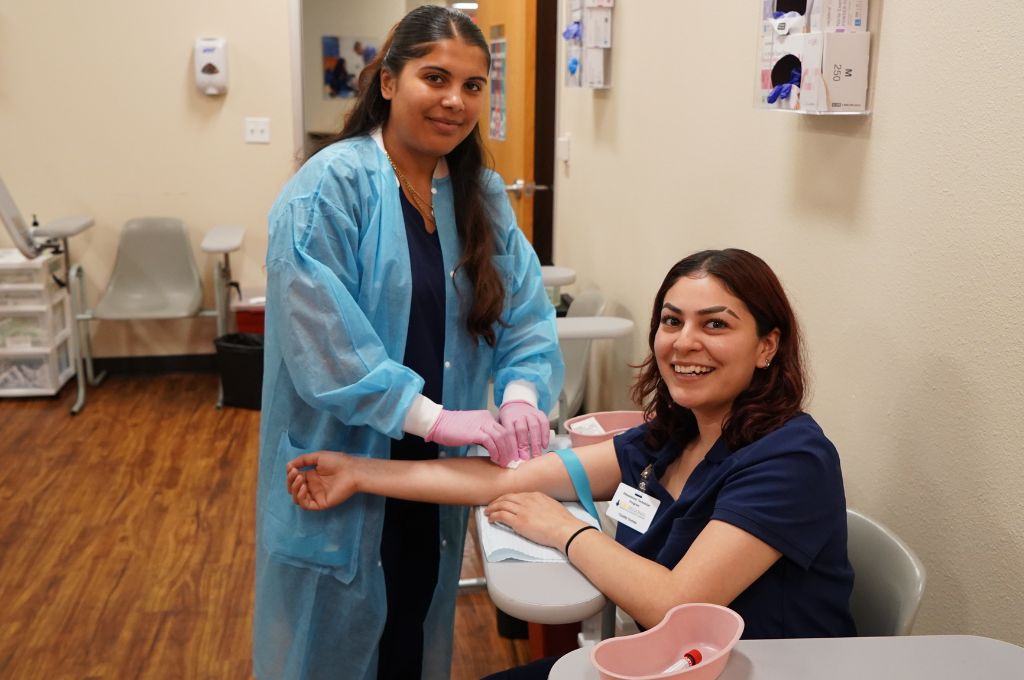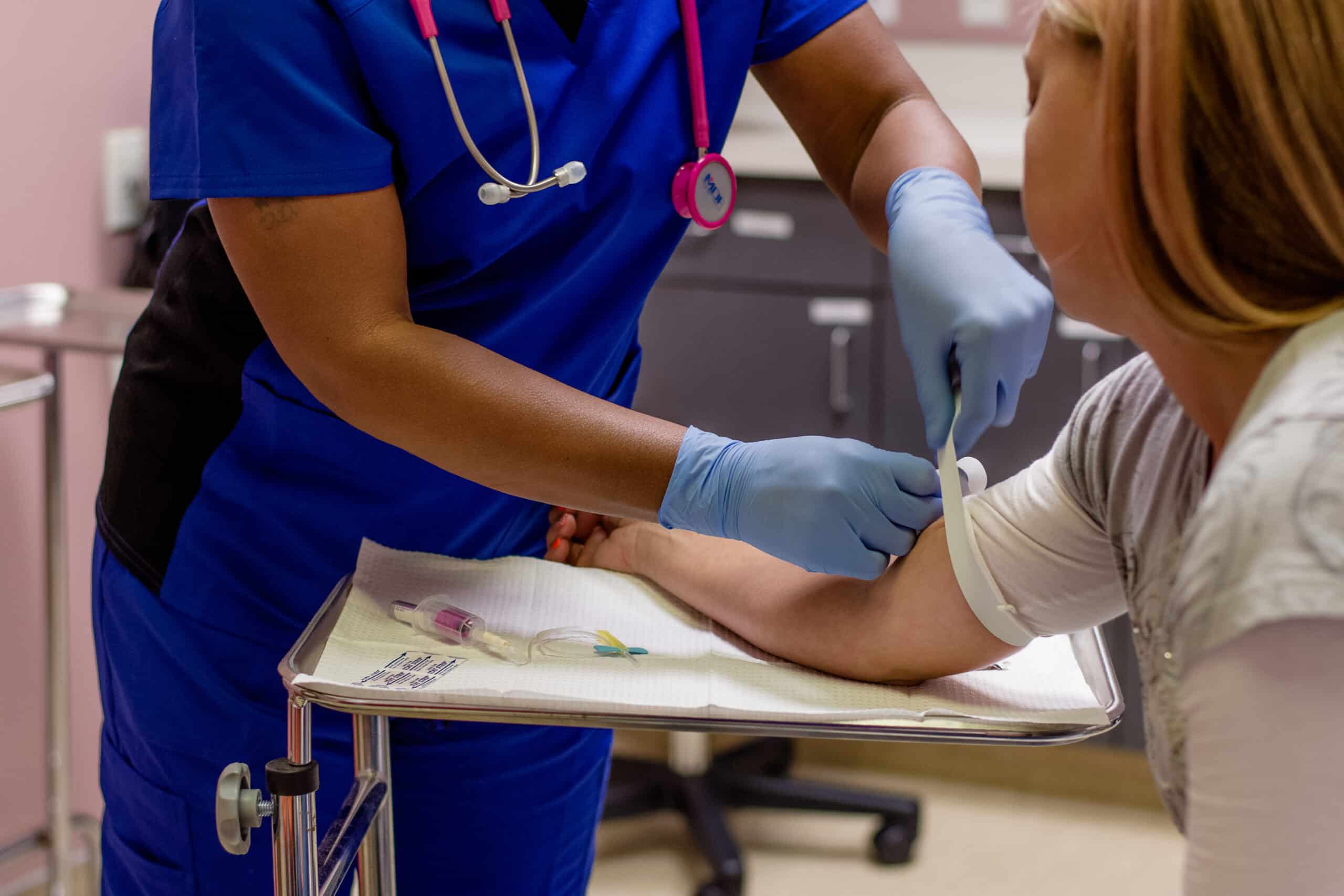The Path to Accreditation: Recognizing the Phlebotomy Educating Program Trip and Its Value
As you take into consideration the course to accreditation in phlebotomy, it's important to recognize the function you'll play in healthcare. Your training will certainly cover necessary abilities, from blood collection strategies to patient interaction.

The Function of Phlebotomists in Healthcare
Phlebotomists play a necessary role in the healthcare system, working as the crucial link between people and important diagnostic screening. You'll carry out blood draws, ensuring examples are gathered accurately and securely. Your experience helps in detecting clinical problems, monitoring health, and directing therapy choices.
In your day-to-day interactions, you'll need to develop depend on with patients, making them feel comfy throughout what may be a stressful experience. You are in charge of labeling and managing examples carefully to stop contamination or mistakes, which might impact examination results.
Beyond this, you'll usually work along with medical professionals and registered nurses, interacting critical details about people' conditions. Your function is basic in maintaining the process in medical care setups, making certain prompt and accurate outcomes. By grasping your skills, you add meaningfully to person care, making you an indispensable part of the clinical team. Embracing this duty is crucial to your success as a phlebotomist.
Review of Phlebotomy Training Programs
When exploring phlebotomy training programs, you'll find different types developed to fit different routines and discovering designs. Each program assists you create vital abilities like blood collection and patient interaction. Understanding these choices is crucial to picking the right path for your profession.
Sorts Of Training Programs
A number of types of training programs are available for those looking to come to be competent in phlebotomy. In addition, some hospitals and centers offer on-the-job training programs, providing functional experience while you find out. Whatever course you select, each program aims to furnish you with the necessary skills for a successful phlebotomy profession.

Secret Abilities Developed
Understanding phlebotomy calls for a collection of essential skills that are developed via thorough training programs. Additionally, interaction skills are basic; you'll need to connect with people, clarify treatments, and put them at ease. Each of these skills is crucial for your success as a licensed phlebotomist, making you an important property in any type of medical care setup.
Trick Components of a Phlebotomy Program
In a phlebotomy program, you'll focus on necessary subjects that prepared for your future career. You'll take part in hands-on training that allows you to use what you've discovered in real-world settings. Both the curriculum and sensible experience are important for your success as a phlebotomist.
Curriculum Review
While pursuing a phlebotomy training course, you'll experience a core educational program made to outfit you with basic skills and knowledge. Phlebotomy Classes Near Me. This educational program usually includes composition and physiology, concentrating on the blood circulation system and recognizing blood parts. You'll additionally discover different sorts of blood collection methods, including venipuncture and capillary slit strategies
Additionally, infection control and safety procedures are essential elements, guaranteeing you recognize how to maintain a sterile environment. You'll examine patient communication, highlighting interaction and compassion, which are essential for reducing individual anxiety. Lastly, moral and lawful factors to consider will be dealt with, preparing you for real-world obligations. This fundamental expertise will certainly enable you to succeed as a phlebotomist and give top quality care in scientific settings.
Hands-On Training Experience
Getting hands-on experience is an indispensable part of your phlebotomy training course. This practical training allows you to use what you have actually discovered in a real-world setting, enhancing your abilities and confidence. You'll practice venipuncture methods, discover how to deal with various sorts of specimens, and get acquainted with the equipment utilized in the area. Under the advice of knowledgeable trainers, you'll fine-tune your skills, ensuring you're planned for any type of circumstance you might encounter.
Additionally, you'll obtain the possibility to connect with individuals, which is important for creating your communication abilities. This mix of technical efficiency and social skills is crucial for your success as a certified phlebotomist. Eventually, hands-on training is where theory satisfies technique, solidifying your understanding and preparedness for qualification.
Certification and Licensing Needs
Prior to you can begin your career in phlebotomy, it is essential to recognize the qualification and licensing demands that vary by state. Many states call for phlebotomists to hold a certification from an identified see this website company, such as the National Phlebotomy Association or the American Society for Scientific Pathology. These qualifications usually entail passing a test that examines your knowledge and skills in the field.
Along with qualification, some states have details licensing needs. You may require to finish a particular number of hours in professional technique, send evidence of training, or go through a history check. It is vital to research your state's policies to make certain you meet all necessary requirements.
Remaining informed about these requirements not just assists you safeguard a setting yet likewise improves your trustworthiness as an expert. By meeting these demands, you'll be well on your way to a successful profession in phlebotomy.
Hands-On Training and Practical Experience
Hands-on training and functional experience are essential elements of your phlebotomy education and learning, as they allow you to apply theoretical expertise in real-world circumstances. During your training, you'll take part in monitored venipuncture, find out proper methods, and end up being knowledgeable about numerous blood collection tools. This straight involvement is important for building your self-confidence and sharpening your abilities.
You'll function closely with skilled experts that can assist you through the nuances of person communication and sample handling. Each technique session not just enhances your understanding however likewise prepares you for the hectic atmosphere of medical care setups.
Furthermore, several programs incorporate professional rotations, permitting you to experience varied setups, from healthcare facilities to outpatient clinics. This exposure aids you adapt to various challenges and patient demands, ensuring you're well-prepared for your future duty. Welcome these possibilities, as they're vital to coming to be a qualified and caring phlebotomist.
Challenges Encountered During Training
While obtaining hands-on experience is necessary, it's vital to identify the difficulties that can occur during your phlebotomy training. In addition, understanding the skills required for blood attracts takes technique; you might have a hard time with technique initially.
Time monitoring can additionally be an obstacle, as balancing theory, useful sessions, and individual dedications can feel intimidating. You may face varying learning paces among your peers, causing see this site sensations of self-doubt if you assume you're falling back. Lastly, adapting to the various individualities of instructors can be difficult, as each may have an one-of-a-kind teaching design.
Acknowledging these barriers beforehand can prepare you for success and aid you develop resilience throughout your training trip.
Career Opportunities After Certification

As you gain experience, you could also take into consideration focusing on areas like pediatric or senior citizen phlebotomy, accommodating specific person requirements. Some phlebotomists choose to progress their jobs by ending up being laboratory specialists or going after more education and learning in healthcare fields.
In addition, your accreditation can bring about duties in training or overseeing brand-new phlebotomists, enabling you to share your expertise. With the health care industry continually expanding, your abilities will certainly always remain in need, leading the way for a steady and fulfilling profession. Welcome the possibilities waiting for you!
Regularly Asked Concerns
What Is the Typical Duration of a Phlebotomy Educating Program?
Phlebotomy training programs usually last around 4 to 8 weeks. You'll participate in hands-on method, classroom guideline, and on-line learning. Finishing this training prepares you for certification and a gratifying career in healthcare.
Are Online Phlebotomy Courses Available?
Yes, on-line phlebotomy training courses are available. They supply flexibility and convenience, allowing you to examine at your own rate. Just verify the program is approved to meet accreditation needs and gain important skills for your job.
Just How Much Does Phlebotomy Training Typically Expense?
Phlebotomy training commonly costs in between $700 and $2,500, depending upon the program and place. You ought to consider elements like course length, included products, and hands-on experience when choosing the best training for you.
What Are Usual Requirements for Phlebotomy Training?
Common requirements for phlebotomy training often consist of a high college diploma or GED, booster shots, and a background check. Some programs might additionally call for basic medical care understanding or certifications, guaranteeing you're prepared for hands-on training.
Can I Work While Completing My Phlebotomy Training?
Yes, you can work while completing your phlebotomy training. Numerous trainees balance tasks with their studies, yet make certain to manage your time properly to assure you satisfy both work and training commitments successfully.